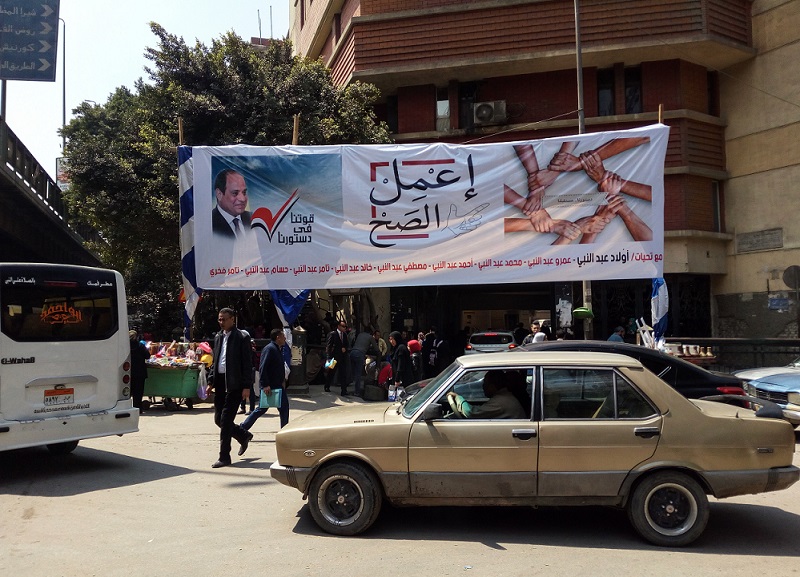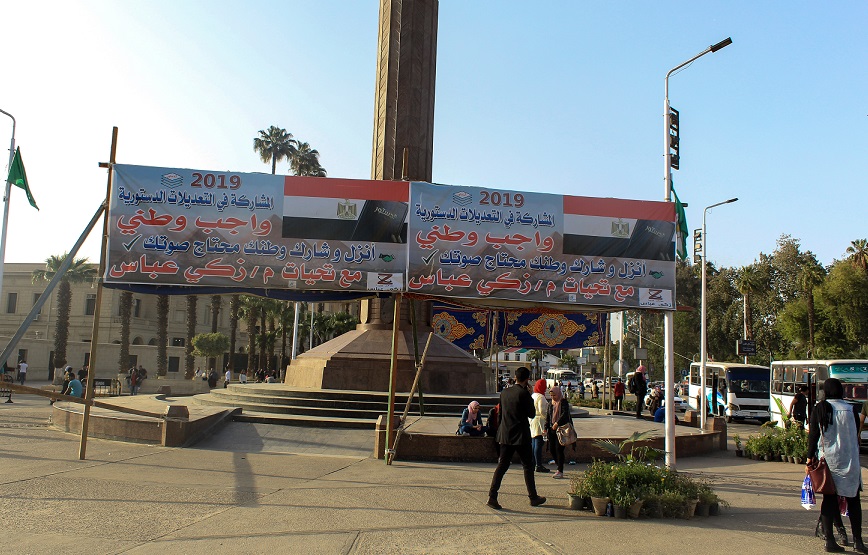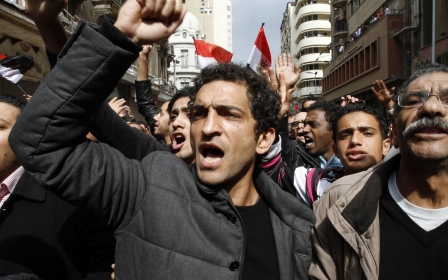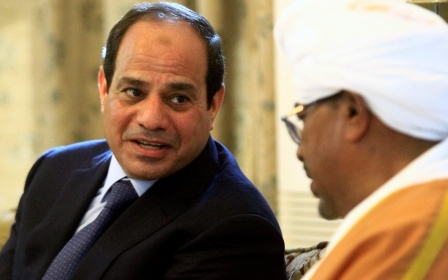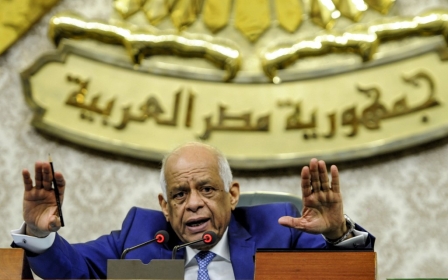REVEALED: Egyptian police coerce shopkeepers to support pro-referendum campaign
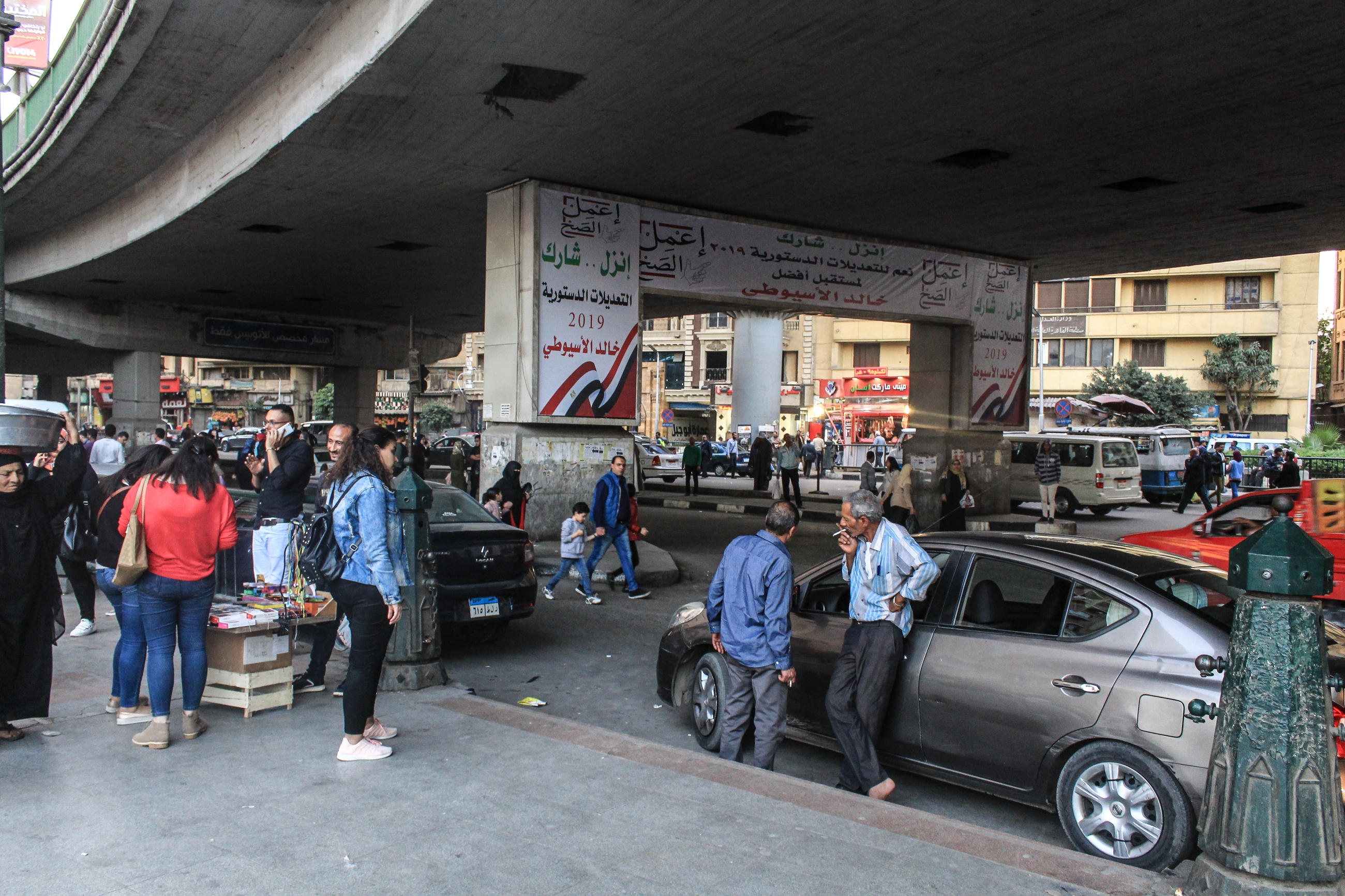
For seven years, Ahmed*, a kiosk owner selling cigarettes, snacks and soft drinks in Cairo’s working-class neighbourhood of Ain Shams, hung a picture of his son, Mohamed, on the front of his shop. In January 2011 while protesting, police shot and killed the young man in his twenties.
But earlier this month, Ahmed got a call from the local police station: he would need to replace his son’s photo with another banner, one that said he supported proposed constitutional amendments.
'The police came to the kiosk and ordered me to give them $87 so they will hang a big banner'
- Ahmed, kiosk owner in Cairo
“We don't know anything about the amendments or the constitution. The police came to the kiosk and ordered me to give them 1,500 Egyptian pounds [$87] so they will hang a big banner,” Ahmed said.
The proposed amendments, which have been in the works for months, would extend the rule of Egyptian President Abdel Fattah el-Sisi’s term until 2030.
This week, only one day after Egypt’s parliament overwhelmingly approved the amendments, the country’s electoral agency announced that referendum voting would start on Saturday and run through Monday.
New MEE newsletter: Jerusalem Dispatch
Sign up to get the latest insights and analysis on Israel-Palestine, alongside Turkey Unpacked and other MEE newsletters
Meanwhile, the state has blocked more than 34,000 websites in an attempt to restrict an opposition-led campaign that has been launched in an attempt to rally Egyptians against the amendments which activists and rights groups say will only further enshrine military rule in the country.
However, in addition to shutting down websites and moving the referendum forward at a fast clip, the state has also mobilised resources and personnel to bribe and intimidate voters to support the amendments, more than a dozen Egyptians have told MEE.
Like Ahmed, shopkeepers, business owners, restaurant proprietors and members of elite families from various parts of the country told MEE that security officials have coerced them into hanging posters backing the amendments – and paying money for the banners on top of this.
Some say the police have threatened to reopen closed investigations or revoke permits for businesses if they don’t hang the banners, which cost just under $30 each. Depending on the type of business, the police demand that different numbers of banners go up. A cigarette kiosk owner will pay for two, while a seafood restaurant must hang five, according to interviews.
The banners, according to multiple sources, are part of a campaign engineered by Nation's Future, a political party widely believed to be affiliated with Egyptian intelligence and formed in the wake of the 2013 coup. It now wields the second-largest number of seats in parliament.
Since 2018, the party has organised mobile medical clinics and outlets selling subsidised food and school outfits to the country’s poorest villages.
Now, a source in the country’s general intelligence told MEE, the party is mobilising behind the referendum campaign because there are serious concerns that Egyptians will vote no.
'Tick the box'
Hung up across the country this week, the posters all have the same layout and colour scheme, with nationalist slogans like “Participation is a responsibility” and “Do the right thing”, which also doubles in Arabic to mean "Tick the box".
The same slogan has been featured in several catchy songs released by various pop stars this month, including '"Do the Right Thing" sung by Moustafa Hagag and "We Want a New Constitution" by Shaaban Abdelreheem (below). The songs have been on regular rotation on Egyptian TV and Saudi satellite channels running in-between commercials.
"We want a new constitution… We all know from the beginning that the constitution had problems," Abdelreheem sings.
Then, as images of Muslim Brotherhood leaders and former oppositional presidential candidates Ayman Nour and Mohammed el-Baradei are shown, he wails: "We approved it at that time because we just wanted the traitors to get the hell out… and the entire nation was on the verge of hell… we approved it to get rid of the traitors and the evil one."
On the campaign banners that have gone up, many carry the name of the shop or the person who sponsored the posters, giving the impression that there is locally grown support for the amendments and that they were put up voluntarily.
'Even the toughest and richest businessman will follow the orders. No one will dare to speak'
- Hassan, restaurant owner in Cairo
While it is generally understood among Egyptians that the party is the force behind the campaign – its logo is marked on some banners and it has sponsored street parties in support of the amendments – this is first time it is being reported that the party is the force behind the banners.
A source working in the Cairo governorate, who requested anonymity and confirmed that the party was behind the campaign, told MEE that the police take the money from the shopkeepers and give it to governorates and local municipalities, who then work with the party to put up the posters.
In Cairo, nine shopkeepers in several different districts told MEE that personnel from nearby police stations had ordered them to hand over money in order to hang the posters.
Mohamed, owner of a cafe in the Heliopolis neighbourhood, told MEE that he was forced to pay 1,000 Egyptian pounds ($58) to hang two posters.
“Two plain clothes policemen came and threatened that I should have the money ready otherwise they will fabricate charges against me and close the cafes,” he said.
“We are a small cafe, but there are companies and posh restaurants who paid up to 9,000 Egyptian pounds [$523] to avoid trouble or harassment by the government."
While Mohamed had to put up two posters, Hassan, a restaurant owner in Nasr City, said he had to put up five.
“The investigation bureau in the police station called me and asked for 5,000 Egyptian pounds [$290] for 10 big banners, otherwise he will reopen a case against me,” he told MEE.
The case? Hassan said years ago, he had put tables outside on the street, a strategy which is common among Cairo restaurateurs, but one which is considered illegal expansion under the law. His case was never referred to a judicial body – but he feared it could be if he didn’t hang the banners.
“People do it because they are afraid, but everyone knows we are forced otherwise we will be out of work," he said. “Even the toughest and richest businessman will follow the orders. No one will dare to speak."
In poorer areas of the capital, local residents told MEE that government officials had collaborated with Nation’s Future MPs to mobilise civilians. In the working class neighbourhood of Sayida Zinab, Saed, who owns a juice shop, said that the officials came to his shop and ordered him to “hire a DJ and bring 50 people to the nearest polling station”.
“They said that the 50 should cheer and chant for the constitution for the three days, and that they have to stay there when the TV stations are shooting,” Saed said, adding that he will be voting against the referendum.
“In public, I will act that I will vote yes, but between me and God, I will say no because this oppression has to go,” he said.
'Who are we to intervene?'
More than 480km south in the tourist city of Luxor, bazaar employees told MEE the owners of their companies had been subjected to the same treatment.
'Someone loves his country and wants to show it. Who are we to intervene?'
- Interior ministry spokesperson
Saoud, a worker in the bazaar, told MEE that the owner of the shop where he works will have to rent microbuses and fill them with people to cheer for the amendments, the army and Sisi in front of polling stations and film crews.
Meanwhile, in restive North Sinai, tribes and businesspeople told MEE they have similarly pledged their allegiance, but unlike others, were not coerced with threats.
One of the elder members of the Tarabin tribe which has been fighting Islamic State group insurgents alongside the military in the area, told MEE: “All tribes hung their posters in the big cities. No one threatened us. But we considered it as a bribe so they can treat us better and allow us to continue our trade and release detainees from the tribes.”
A representative of the interior ministry denied that police were involved “whatsoever” in the hanging of the posters.
When MEE asked whether the shops received permits that are required by law to hang posters, the spokesperson said: “Someone loves his country and wants to show it. Who are we to intervene?”
MEE also contacted the Nation's Future headquarters and asked whether the party was aware of the police involvement in its campaign. An official in the party's press office hung up after hearing the questions.
* Only first names have been used to protect the identity of sources.
Middle East Eye delivers independent and unrivalled coverage and analysis of the Middle East, North Africa and beyond. To learn more about republishing this content and the associated fees, please fill out this form. More about MEE can be found here.


